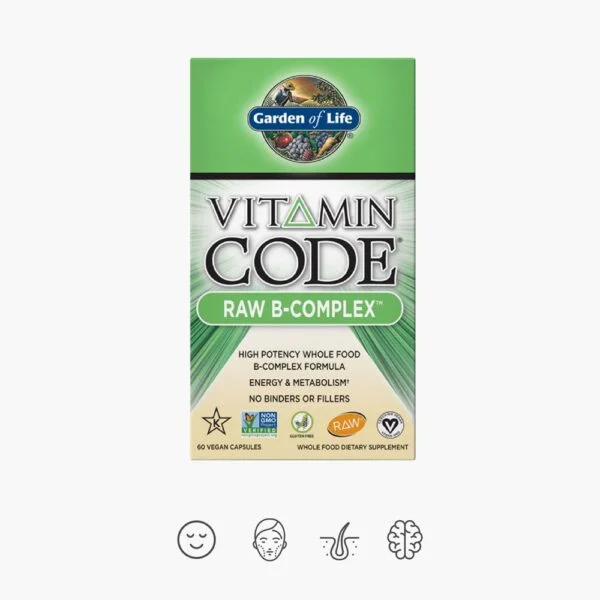Why do we start looking for and interested in diets? Most of the time we start dieting to lose weight. But weight is not the main indicator of well-being and energy.
Finding the most suitable diet is a big challenge, so we will help you.
These world's most popular top diets have high ratings and many positive reviews and negative aspects. But how to choose the most suitable for you? You will learn about it below.
Diet - what is it?
Diet is the totality of our nutrition (what we eat and what rules or principles we follow). Often the word "diet" to us means balancing a certain diet to improve health or weight regulation. Individually adapted nutrition can help us a lot.
So let's take a look at the best diets in the world, along with their pros and cons. This way you can choose which one suits you best.
Mediterranean diet
The Mediterranean diet has long been the highest standard of nutrition, disease prevention, health and longevity. Its benefits are based on assessed benefits and sustainability.
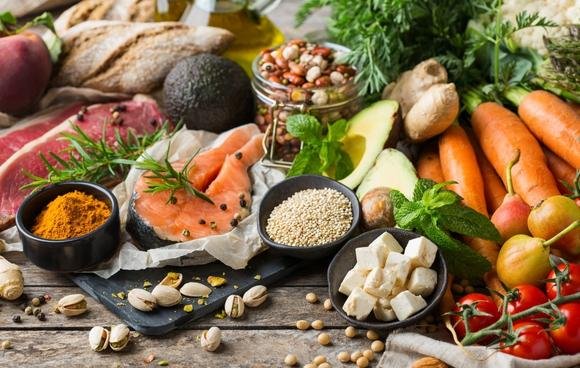
What makes up the Mediterranean diet?
The Mediterranean diet is based on foods traditionally eaten by people in countries such as Italy and Greece. This diet is rich in:
- Vegetables
- Fruit
- Grains
- Fish
- Nuts
- Beans
Foods such as poultry, eggs and dairy products should be eaten in moderation and red meat should be limited.
In addition, the Mediterranean diet limits:
- Refined grains
- Unsaturated fats
- Processed meat
- Added sugar
The benefits of the Mediterranean diet – how can she help
This diet's focus on minimally processed foods and plants has been linked to a reduced risk of many chronic diseases and a longer lifespan. Also, the Mediterranean diet has a preventive effect on certain forms of cancer.
Advantages of the diet:
- Nutritionally reliable. Time tested.
- Various foods. Lots of nutrients.
- We may not count carbs or calories.
- Proven health benefits.
Although the diet was developed to reduce the risk of heart disease, many studies show that its plant-based, high-unsaturated fat diet can also help with weight loss.
Compared to a low-fat diet, the Mediterranean diet resulted in greater weight loss after 1 year. Compared to a low-carb diet, it produced similar weight loss results.
The study showed that type of fat -- saturated, monounsaturated, or polyunsaturated -- is far more important for cardiovascular health than total fat intake. Even up to 40%, all calories from fat can be beneficial for the heart because most of the fat consumed is unsaturated and saturated fat is limited.
Recent studies have also shown that the Mediterranean diet is associated with a reduced risk of mental disorders, including depression.
Cons of the Mediterranean diet - can it harm health?
As with any diet, limiting or cutting out certain food groups can have a negative impact on your health.
Because the Mediterranean diet doesn't place much emphasis on dairy, it's important to make sure you're still getting enough from your diet calcium and vitamin D.
In some cases, the Mediterranean diet can cause:
- Weight gain if you eat more than the recommended amount of fat (eg olive oil in food and nuts)
- Low iron due to not eating enough meat
- Loss of calcium when we eat less dairy products
If you decide to follow the Mediterranean diet, pay attention to what nutrients will need to be replenished by taking quality and natural supplements.
Tips for people following this diet
One nutritionist followed the Mediterranean diet, adapting it to her Colombian tastes, and found that it helped her cope with her heart health problems.
Basic recommendations for people who want to start following this diet:
- Start small by adding some of your favorite fruits and vegetables to your menu.
- Stock up on basics like whole grains and vegetables and focus on learning how to prepare them and incorporate them into your meals.
- Learn to serve the right portion sizes and variety, from cereal to pasta to steak.
The Mediterranean diet emphasizes eating plenty of fruits, vegetables, fish, and healthy oils while limiting refined and highly processed foods.
Although it is not a weight loss diet, studies show that it can promote weight loss and improve overall health.
Mediterranean Diet Ranking:
| Rapid weight loss | 2.3/5 |
| Long-term weight loss | 4.2/5 |
| This diet is easy to follow | 4.3/5 |
| The healthiest diet | 4.6/5 |
DASH diet
In order to stop hypertension (high blood pressure) the DASH diet is usually chosen.

This diet emphasizes eating lots of fruits, vegetables, whole grains, and lean meats. It is low in salt, red meat, added sugar and fat.
Although the DASH diet is not a weight loss diet, many people report that following it results in natural weight loss.
How does the DASH diet work?
The DASH diet recommends certain servings of different food groups. The number of servings you are encouraged to eat depends on your daily calorie intake.
Following this diet plan, it is recommended to eat:
- Vegetables
- Whole grains
- Low-fat dairy products
- Fish
- Poultry
- Beans
- Nuts
For example, each day, the average person following the DASH diet should eat about:
- Five servings of vegetables a day
- Five servings of fruit
- Seven servings of healthy carbohydrates (whole grains)
- Two servings of low-fat dairy products
- Two servings or less of lean meat
In addition, it is recommended to eat nuts and seeds two or three times a week.
Benefits of the DASH Diet - Can It Be Helpful?
The DASH diet has been shown to reduce blood pressure levels and several heart disease risk factors. In addition, following this diet may reduce the risk of breast and colon cancer.
The DASH diet can also help you lose weight. An analysis of 13 studies found that people following the DASH diet lost more weight over 8 to 24 weeks than those following a strict diet.
Advantages of the diet:
- Nutritionally reliable.
- It is rich in fiber-rich foods.
- A clearly defined plan with prescriptions.
- You can eat a variety of foods.
In addition to weight loss, the DASH diet can help combat symptoms of depression.
An 8-year comparative study found that moderate adherence to the DASH diet was associated with a lower risk of depression.
Cons of the DASH Diet - Can This Diet Be Harmful?
Despite the many benefits of the DASH diet, there are some potential drawbacks. Such as:
- It is difficult to follow this diet
- No semi-finished products
- There is no organized diet plan
- Great monitoring of what to eat is required
- Not intended for weight loss
- The diet is not for everyone
For example, a person often consumes 3400 milligrams of sodium per day. Most of our salt intake comes from processed foods, which the DASH diet severely limits.
Although the DASH diet can help with weight loss and lower blood pressure, in individuals with hypertension. Limiting salt intake is said to be one of the most important parts. You can learn more about the most important salts - The 5 most important types of salt and what you should know about them
The DASH diet is a low-salt diet that has been shown to help with weight loss.
Studies have also linked it to additional benefits for your heart and reduced risk of other chronic diseases.
DASH Diet Ranking:
| Rapid weight loss | 2.8/5 |
| Long-term weight loss | 4.4/5 |
| This diet is easy to follow | 4.3/5 |
| The healthiest diet | 4.5/5 |
Plant-based diet
Vegetarianism and veganism are the most popular versions of plant-based diets that limit animal products for health, ethical, and environmental reasons.
However, there are other plant-based diets. A flexible diet is a plant-based diet that allows you to eat animal products in moderation.
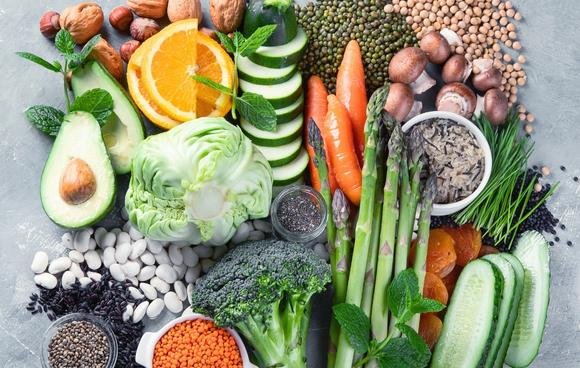
How does a plant-based diet work?
Typical plant-based diets limit all types of meat, but allow dairy products. However, a vegan diet limits all animal products, including milk, butter, and sometimes other byproducts such as honey.
A flexible eating plan does not have clear rules or guidelines for calories and macronutrients, so it is considered more of a lifestyle than a diet. Its principles include:
- Consume proteins from plants, not animals
- Eat mostly fruits, vegetables, legumes and whole grains
- Eat the least processed, most natural foods
- Limit sugar and sweets
In addition, it allows the occasional consumption of meat and animal products.
Is a plant-based diet healthy?
Numerous studies have shown that plant-based diets can reduce the risk of chronic diseases, including better metabolic rates, lower blood pressure, and a lower risk of type 2 diabetes. It can also help you lose weight.
This diet can have various advantages, such as:
- Improved cardiovascular health (lower blood pressure, lower heart rate, reduced risk of cardiovascular disease)
- Lower total cholesterol
- Lower risk of developing type 2 diabetes
For those who want to live a sustainable lifestyle, reducing meat consumption can also reduce greenhouse gas emissions, deforestation and soil degradation.
Cons of a plant-based diet - do you know them?
A plant-based diet: vegetarianism and veganism can sometimes be difficult to maintain due to its restrictive food spectrum.
What are its disadvantages and disadvantages?
- Low protein intake
- Iron deficiency
- Decreased bone mineralization and increased fracture risk due to lower calcium and vitamin D intake
- Vitamin B12 deficiency
- Lower intake of essential fatty acids
Vegan diets carry some risk of getting insufficient amounts of protein, vitamins and minerals. However, these risks are easily overcome by choosing the right vegetarian food and natural supplements.
People's opinions about a plant-based diet
A couple of years ago, Agnes read about the vegan diet and was intrigued. She didn't start dieting professionally, but used free online recommendations to stick to the regimen for a couple of weeks. During this time, she ate unprocessed, plant-based foods, including steamed vegetables, salads and lots of fruit.
"I really liked this diet," says Agnė, who lives in Vilnius. "My stomach pains went away and I felt better. I felt like my energy levels were higher and I slept better."
Today, Agnes and her partner adhere to the principles of a vegan diet for about half of their meals, which are entirely or mostly plant-based. "We're constantly thinking about making smart food choices," she says.
Plant-based diets such as veganism and vegetarianism can have real health benefits, such as reducing the risk of type 2 diabetes, high blood pressure and high cholesterol. However, this diet can also restrict some people.
A flexible diet is a less strict version of a vegan diet that allows you to eat as little meat and animal products as possible.
Plant-based diet ranking
| Rapid weight loss | 4.2/5 |
| Long-term weight loss | 3/5 |
| This diet is easy to follow | 4.1/5 |
| The healthiest diet | 4.1/5 |
MIND diet
This diet combines: aspects of the Mediterranean diet and the DASH diet to eat foods focused on improving brain health.

How does the MIND diet work?
Like the DASH diet, the MIND diet doesn't have a strict meal plan, but encourages you to eat 10 specific foods that benefit brain health.
During the week, the MIND diet includes:
- Six or more servings of green, leafy vegetables
- One serving of non-starchy vegetables
- Five or more servings of nuts
Other foods that are encouraged to be eaten several times a week include:
- Berries
- Beans
- Olive oil
- Whole grain cereals
- Fish
- Poultry
The advantages of the MIND diet - what is it good for?
Research shows that the MIND diet can reduce the risk of Alzheimer's disease, and the MIND diet has also been shown to be superior to other plant-rich diets in improving brain function.
There is little research on the MIND diet and weight loss. However, since it is a combination of two diets that promote weight loss, the MIND diet can also help you lose weight.
One of the ways it can help you lose weight is by encouraging you to limit your consumption of the following foods:
- Butter
- Cheese
- Red meat
- Fried food
- Sweets
Combining the best of two diets, the MIND diet has a lot more to offer than other stricter diets.
Although you can eat more than the 10 recommended food groups, the more responsible you are with your diet, the better the results.
Are there any downsides to the MIND diet?
This diet does not seem to have any drawbacks. However, it is worth noting that other elements of a healthy lifestyle are also necessary for brain health, such as a good sleep and regular physical activity.
Stories and tips from people following the MIND diet
When the MIND diet works for people, they have many positive things to say:
- Follow less strict rules and pay more attention to your healthy eating habits.
- When eating, choose healthier foods such as salads and vegetable dishes first.
- Berries, especially blueberries, remain essential to the MIND, so eat your fill.
- Social and brain stimulation is also important for brain health, so stay active.
MIND Diet Ranking according to people's ratings
| Rapid weight loss | 1.8/5 |
| Long-term weight loss | 3.5/5 |
| This diet is easy to follow | 3.8/5 |
| A healthy diet | 4/5 |
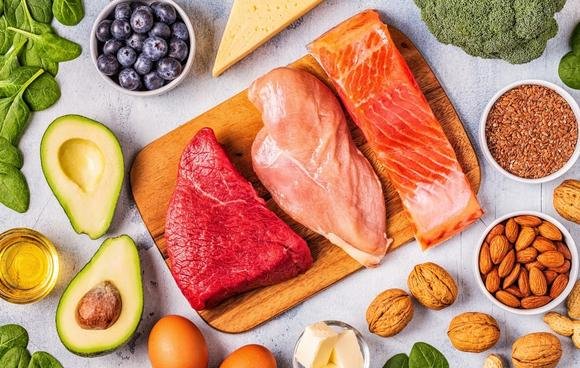
The MIND diet combines aspects of the Mediterranean and DASH diets and may help reduce the risk of Alzheimer's disease and dementia.
A low-carb diet
A low-carb diet is one of the most popular weight loss diets.
Some diets cut carbs more drastically than others. For example, very low-carb diets such as KETO diet, limits the amount of this macronutrient to less than 10% of total calories, while other types have 30% or less of calories.
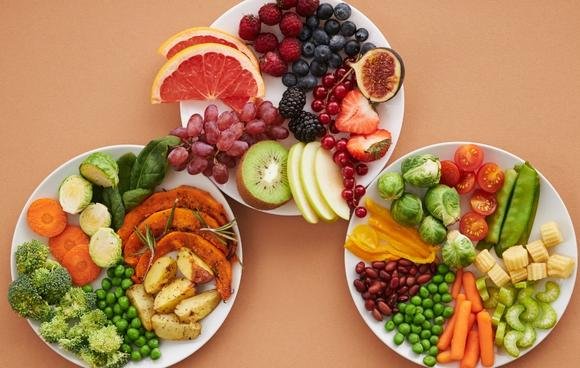
How does a low-carb diet work?
A low-carb diet restricts carbohydrate intake in favor of protein and fat.
It is generally higher in protein than low-fat diets, which is important because protein can help reduce appetite, improve metabolism, and preserve muscle mass.
Low Carbohydrate Diet - Helps Improve Health?
Research shows that a low-carb diet can reduce heart disease risk factors, including high cholesterol and blood pressure. It can also improve blood sugar and insulin levels in people with type 2 diabetes.
Foods and drinks not included in a low-carb diet:
- Sweet foods and drinks
- Grains. Bread, pasta, rice, etc.
- Legumes. Beans, peas and lentils
- Root vegetables. Potatoes, sweet potatoes and pumpkins
- Fruits of many kinds. Bananas, mangoes and pineapples
- Alcohol
- Fruit juices and dried fruits
Many studies show that low-carb diets can help you lose weight and be more effective than regular low-fat diets.
Advantages of following this diet:
- Increases appetite.
- Helps you lose more weight.
- Most of the fat is lost from the abdomen.
Also, a low-carb diet is quite effective in burning belly fat.
Can a low-carb diet have its downsides?
In some cases, a low-carb diet can increase LDL (bad) cholesterol levels. This diet can also be difficult to follow and may cause indigestion in some people.
In very rare cases, following a very low-carb diet can lead to a condition called ketoacidosis, a dangerous metabolic disease that can be fatal if left untreated.
Dangers of this diet:
- Constipation
- Headache
- Cramps
If you don't replace those nutrients with other food sources, you could be at risk for nutrient deficiencies.
To supplement your keto diet:
-
Sale Product on saleGarden of life Vitamin Code RAW B-COMPLEX – B group vitamins complete with probiotics, antioxidants and enzymes. Bioactive complex, 120 vegan capsules
59,90 €Original price was: 59,90 €.38,90 €Current price is: 38,90 €. -
Sale Product on saleTrace Minerals ConcenTrace liquid marine mineral complex, 118 ml
39,90 €Original price was: 39,90 €.31,90 €Current price is: 31,90 €.Rated 4.80 out of 5 based on 5 customer ratings -
Trace Minerals Mega Magnesium and Calcium with minerals, 120 tablets39,90 €
Low Carb Diet Ranking:
| Rapid weight loss | 4.1/5 |
| Long-term weight loss | 4.7/5 |
| This diet is the easiest to follow | 3.2/5 |
| The healthiest diet | 4/5 |

The best diet - how to decide?
There are many diets suitable for people of all ages, including options tailored to specific health conditions and specific body transformation goals.
When choosing a diet, be sure to consider the goal of the diet, its potential health benefits, the amount of effort required, and whether it is based on high-quality research.
You should also avoid diets that are unsustainable or overly restrictive, and be sure to check with your health practitioner before changing your diet, especially if you have any underlying medical conditions.
How find out which vitamins, minerals or other supplements the most appropriate at the moment? Try it free test "Your Day" ! where you will find out needs of the body and you will get personal recommendation!

